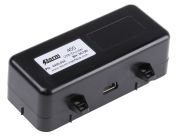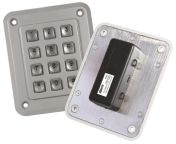Keyboard Encoders
A keyboard encoder (also called keyboard controller) is a device that acts as the link between a keyboard and a computerised device. Their primary function is to inform the computer when an action takes place on the keyboard. When data from the keyboard arrives, the controller activates a keyboard interrupt notification to allow the central processing unit (CPU) to handle the input. If the keyboard encoder is not directly attached to the keys, the scan codes are received via a microcontroller embedded in the keyboard.
What are keyboard encoders used for?
Keyboard encoders are used in computers, laptops and other smart devices like mobile phones. Keyboard encoders are also integral to homeware appliances and industrial machinery. Any appliance that uses a keypad mechanism to direct and control its behaviour also requires a keyboard encoder.
Types of keyboard encoders
Keyboard encoders come mainly in USB or RS232 varieties.
USB compatible encoders attach to the rear surface of keyboards to provide connectivity to the host system via the USB port.
RS232 keyboard encoders are located inside the keypads of devices like modems, printers, data storage units, uninterruptible power supplies, and other peripheral computer devices.

